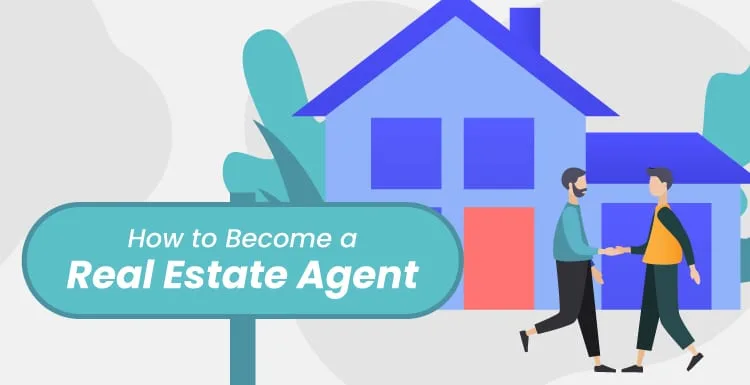If you’re wondering how to become a real estate agent, you’re in the right place.
Our complete guide covers everything from pre-license training to maximizing leads. Read on to learn how to jump-start your real estate career.
How to Become a Real Estate Agent
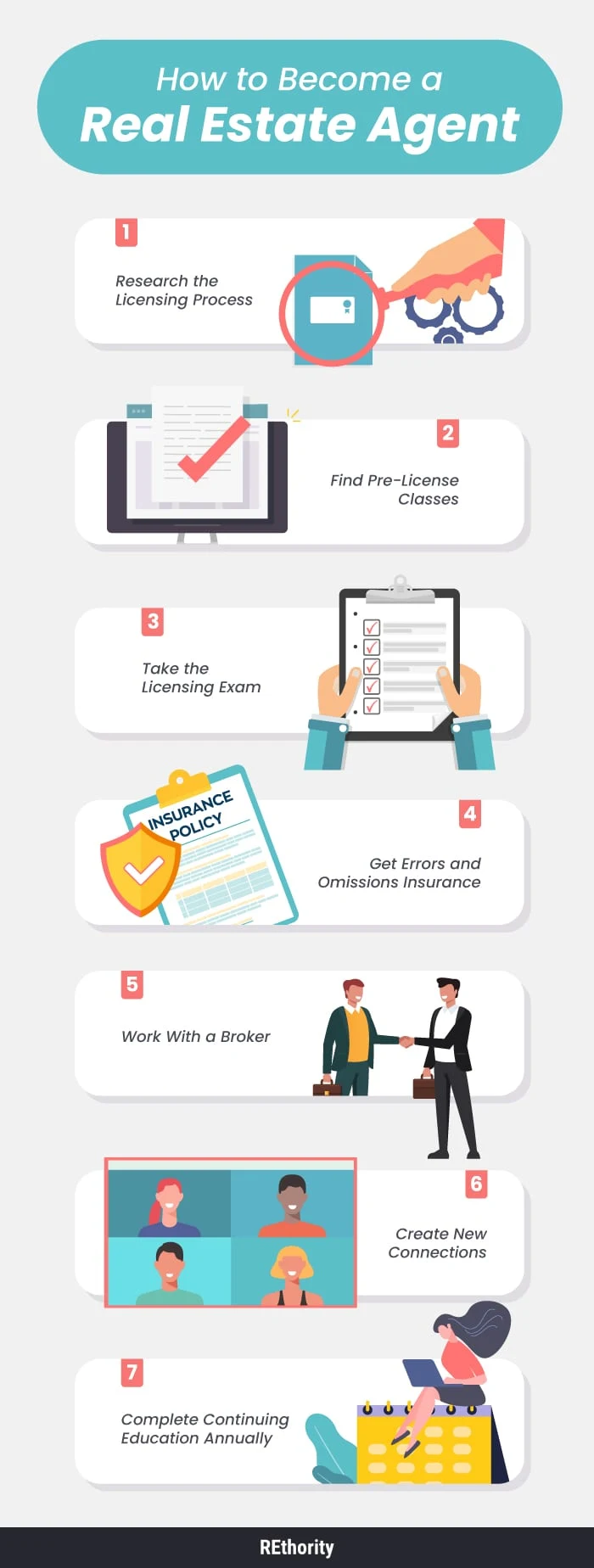
Real estate is an industry packed with potential, but it’s also an industry where the term “you have to spend money to make money” takes on a whole new meaning.
Click for Illustrated Video Career Guide
Still, if you’re really interested in becoming a real estate agent, then read on to find out the steps you need to take to launch your new career.
There are a few basic steps everyone must go through in order to become a real estate agent, no matter what state you’re in. Start by carrying out these fundamental actions:
1. Research the Real Estate Licensing Process
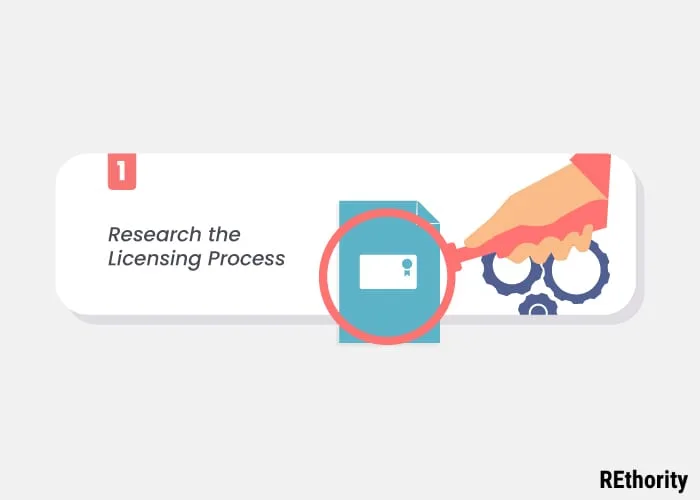
Every state is a little bit different in what it requires for you to become a full-fledged real estate agent. The state-specific requirements and details for your state must be searched out beforehand because they’ll influence the path you take.
Research the proper method to become licensed in your state. You can do an online search or contact your state’s Real Estate Commission Office to find out more.
Satisfying your state’s requirements usually involves a mix of classes, getting on board with a brokerage, and then passing state exams. Oh, and you’ll need to pay membership fees too.
2. Find Pre-Licensing Classes
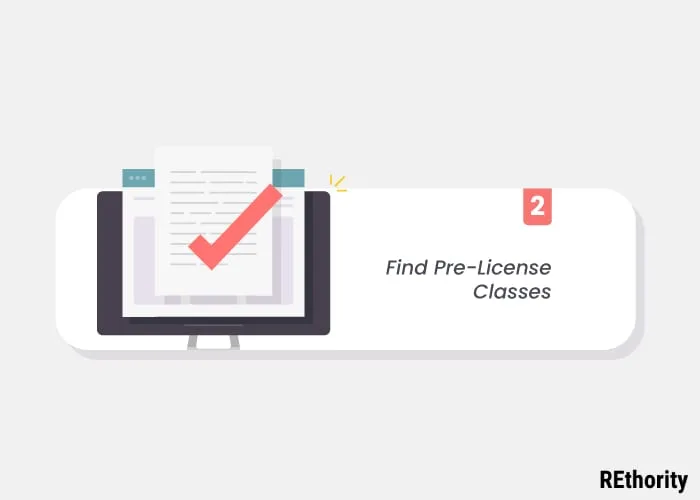
Before you are eligible to take your licensing exam, you’ll need to take real estate courses. These courses focus on several different sides of the real estate world to help put together the real estate puzzle for you as an agent.
Of course, where you live determines what the coursework should look like, but in general, coursework will include classes that teach you about:
- Real estate law
- Real estate brokerage
- Real estate fundamentals
- Property management
- Real estate principles
- Business law
- Real estate finance
- The law of contracts
There are many real estate institutes, online programs, and even colleges that offer these courses. Simply remember to get all the information you need to confirm the courses after you’ve finished so you can apply to take the licensing exam.
Our favorite real estate exam prep is made by Real Estate Express. Courses are online, and their study tools are second to none. I personally used them when studying for my real estate license and found their programs to be the best in the business.
3. Take the Licensing Exam
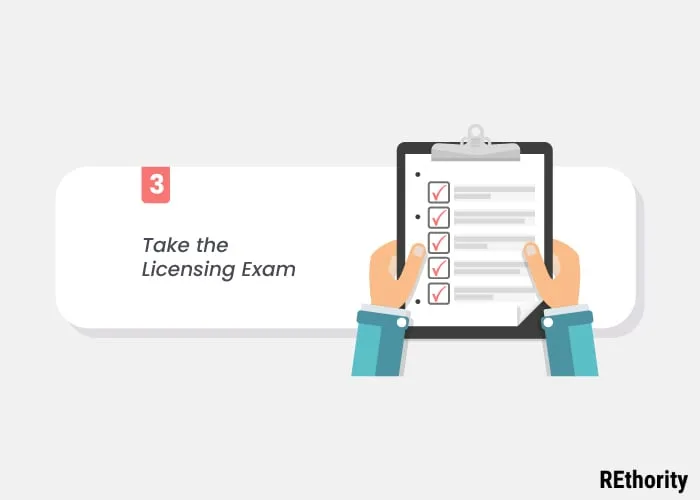
When all the coursework is done and you’re prepped, you can take the mandatory real estate exam in your state and apply for your license. The sooner you can take the test after finishing classes, the better off you’ll be.
Completing the test quickly is recommended because not only will the information be fresh in your mind, but also because if you happen to fail the exam, you’ll have two years to retake and pass it in most states.
If more than two years go by, then you may have to take the coursework all over again before you can retake the exam.
Are you worried about passing the first time you take it? If you diligently complete your coursework and prepare for the test, then you have a very good chance of passing the first time you have a go at it, so don’t sweat it!
4. Get Errors and Omissions Insurance
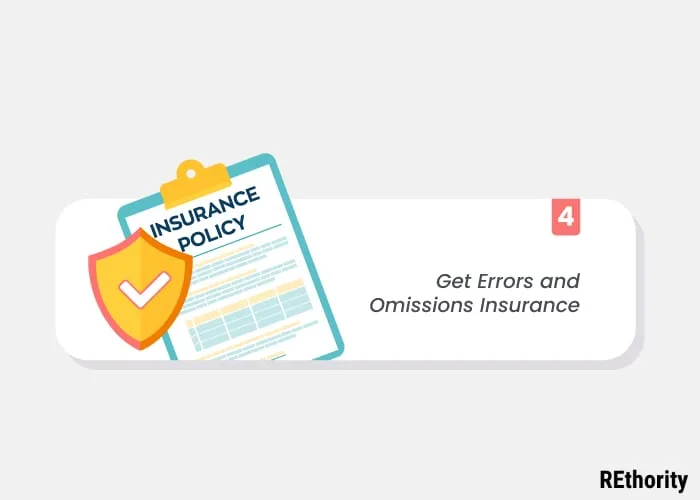
Errors and Omissions Insurance (also called E&O) is a critical piece of the real estate licensing process.
Essentially, this is a policy most states require you, as an agent, to carry. This policy protects you from inadequate work, negligence, or simple mistakes.
5. Work With a Broker
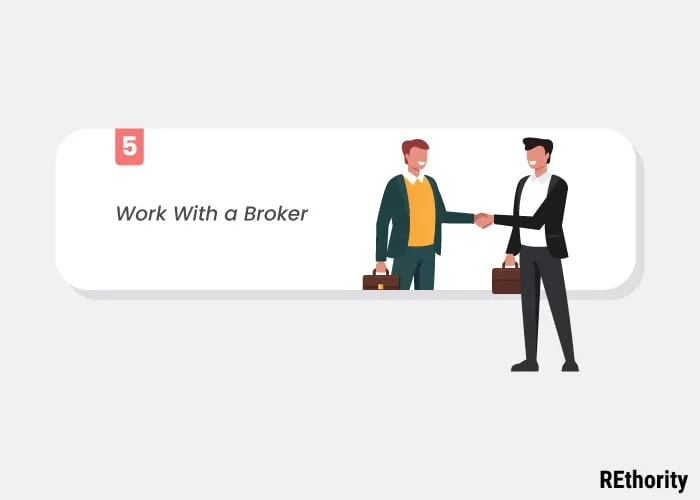
Once new agents have completed the exam, passed it, and have their real estate license in hand, they’re required to work with a broker to complete their real estate education.
For the first two years, a broker must sponsor and manage you according to most states’ laws. You may even be required to find this broker before you take the exam.
However, this really boils down to the requirements in your state. You should start looking for a broker to sponsor you as soon as you can.
Typically, the broker you work with doesn’t pay you. Instead, you’ll make commissions from listings and sales. Commissions are usually split between four parties: the buyer’s agent, the listing agent, and their brokers.
It’s not unusual for brokers to let their agents keep all of the commission, but they may ask you to pay a monthly “desk fee” for utilizing the resources of their brokerage.
6. Create New Connections
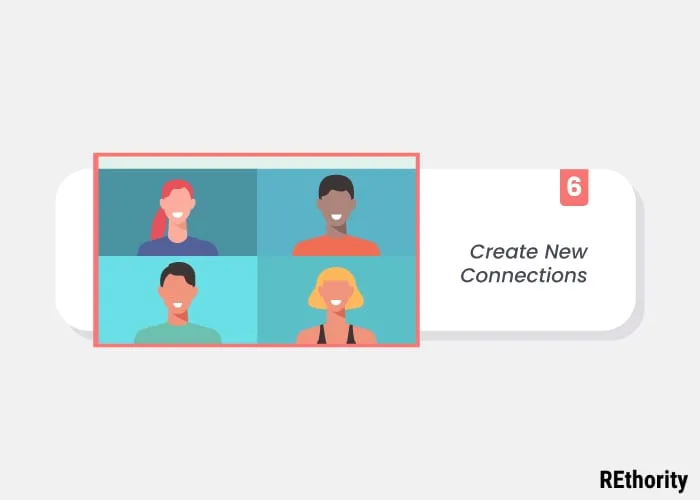
The broker who mentors you may be able to help you learn the ins and outs, as well as a few experienced tips, to help you get started and flourish in real estate.
It’s important to understand that being a real estate agent is about the networks you can cultivate. Ultimately, it’s these connections that can help you succeed in the long run.
Networking is all about casting your net wide, and a solid marketing plan is critical for success. To start you off on the right foot, make sure to check out our complete guide on marketing for agents.
7. Don’t Forget Continuing Education
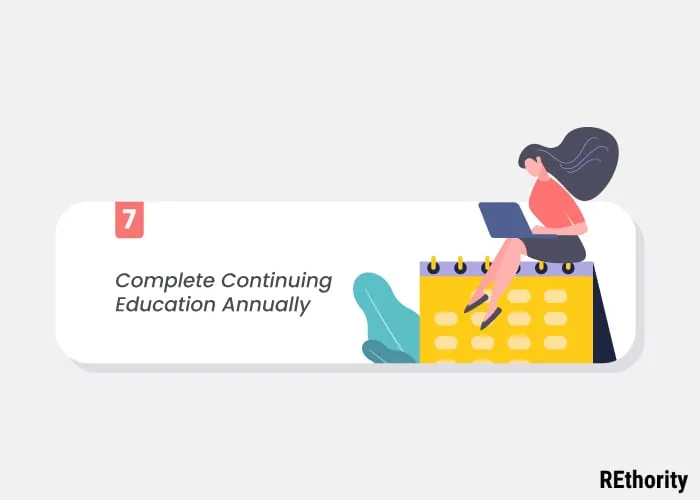
If you thought passing your exam was all you needed to do for licensing, you’re not alone.
However, you must continually improve upon your knowledge in what are known as continuing education hours.
Picking a Real Estate Brokerage
There are many different ways to be a real estate agent. You can go it alone, work for a brokerage, or find the best of both worlds at a virtual brokerage.
But how do you choose a real estate brokerage to work for? The different types include:
National Franchises
A national franchise brokerage is probably the type you’re most familiar with. These national companies sell the rights to their name, business model, and branding to agents.
After they sell a franchise, they charge a percentage for every deal the office closes. Many national franchises are independently owned, but they must still follow regulations and rules set by the main office of the franchise.
There are pros and cons to working for a national franchise. The biggest pros are instant credibility and name recognition.
The hard work of building up the brand has already been done; all the technology systems are in place and the offices are fully stocked
All you need to do is slide right in and start selling! These franchises often attract new real estate agents, and it’s easy to understand why.
Of course, there are drawbacks to working for a national franchise. The biggest is that they can feel impersonal and don’t invest as much in development as smaller brokerages tend to.
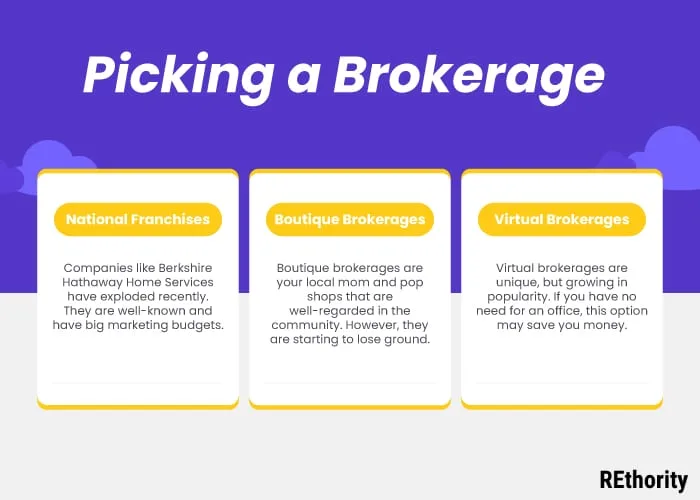
Boutique Brokerages
Small businesses and individual brokers run boutique brokerages. Don’t be fooled into thinking that smaller means less successful, because there are some very successful boutique brokerages out there.
The pros of these agencies are that they’re more personalized and give more individual attention. Since there are fewer real estate agents to contribute to the bottom line of the agency, you’re more likely to get more mentoring and coaching.
There’s also less competition for leads, more flexibility, and the opportunity for you to put your own personal spin on marketing.
Unfortunately, it’s not all puppy dogs and real estate rainbows. The cons of working at a boutique brokerage include smaller budgets for marketing, not as much brand recognition, and fewer technological resources for their agents.
Virtual Brokerages
If you want to be independent, then a virtual brokerage may be for you. With so many real estate software systems available and the increased popularity of social media, this is an option that’s becoming more and more popular.
The biggest pro of this type of brokerage is that there are lower overhead costs since you don’t have to pay for office space. This gives them the ability to offer some very attractive commission splits to their agents.
There also tends to be really great tech tools you can use to create your own websites, manage your clients, and manage all your transactions—right from the comfort of your own home.
The only con to virtual brokerages is that, believe it or not, that much independence isn’t for everybody. Many people miss going to an office and having coworkers to share their successes and letdowns with.
If you’re considering a virtual brokerage, give this aspect a lot of thought. Your significant other may not appreciate being your office sounding board!
No matter which you choose, you should interview a brokerage you’re interested in joining. Make sure to ask how they work their commission splits, what kind of leads they provide, and what expenses will be your responsibility.
Agent vs Realtor
It’s not unusual to hear the terms Realtor and real estate agent used interchangeably, but there is a difference between the two that’s important to understand.
Realtors are real estate professionals who are members of the National Association of Realtors. They observe a strict code of ethics and pay membership fees that grant them access to several benefits.
These benefits include discounts on continuing education courses as well as access to marketing resources. It’s not required to become a Realtor, but it is a professional designation that’s worth exploring.
Cost of Getting Into Real Estate
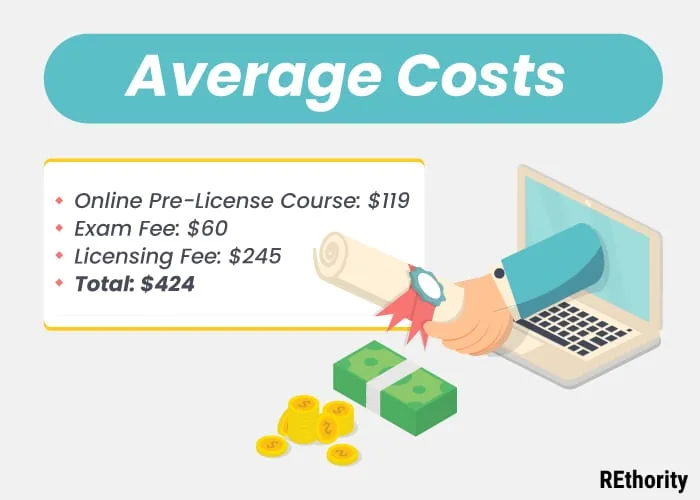
It’s important to sit down and create a budget before you start to pursue a career in real estate. Make a list of potential costs you may encounter, such as:
- Testing fees
- Pre-licensing courses
- Continuing education courses
- Multiple Listing Service (MLS) fees
- Professional development
- Errors and omissions insurance
- Association fees
- Self-employment income taxes
- Health insurance
- Broker costs (and desk fees)
- Office supplies
- Cell phone service
- Internet service
- Marketing materials
- Technology products and services
- Expenses related to transportation
Average Costs
The biggest cost of becoming a real estate agent is the license. While costs vary by state, we’ll use California as an example.
- Online Pre-license course: $119
- Exam Fee: $60
- Licensing Fee: $245
- Total: $424
As you can see, it’ll cost $424 to get a real estate license. Of course, that’s as of the time of publication, so this is only meant to be used as an example.
If you choose to take any extra prep classes or buy test prep materials, this cost will increase. To be safe, we typically suggest spending just under $1,000 to get a real estate license in most states.
It is worth noting that many brokers will cover the cost of your test if you pass it and work for them. So it’s worth exploring options prior to buying your pre-license materials.
While this may sound like a lot, it’s your first sale, which should more than cover this cost. If you want to save more money, use an online real estate school (more on that later).
Administrative Costs
In addition to your pre-license testing costs, you’ll need to pay for anything related to your business.
We highlighted some common expenses above, and a ballpark estimate for overhead is between $500 and $1,000, depending on how much you’ll invest in marketing and automation.
Again, many brokers will cover much of your overhead, but this will reduce your portion of the commission split. What agents may choose to do is build up their book of business and re-negotiate their commission split after they begin producing.
How to Budget
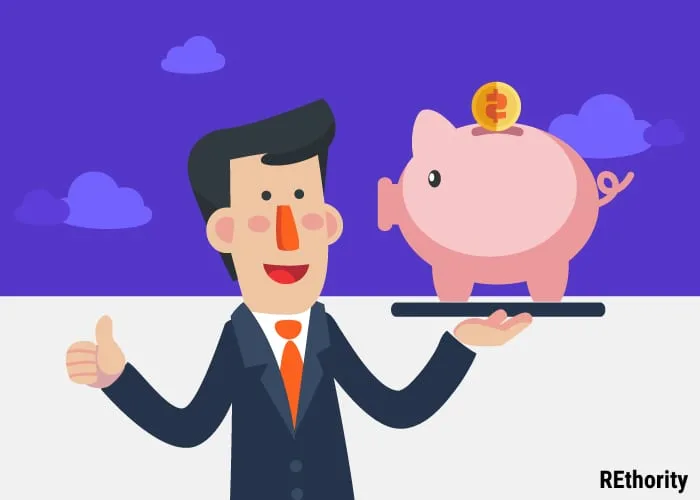
If you want to become a real estate agent, then it’s important to put a plan in place to support yourself financially.
Don’t panic – it looks expensive but with some financial planning, it can be smooth sailing. You should create a budget that includes:
Savings
When launching your real estate career, don’t overlook how you’ll support your own household expenses while you’re reaching your goal.
You’ll earn commissions, but you’ll be a lot more comfortable if you save enough before you launch into this new career to support your household for a while without any money coming in.
Track Your Expenses and Savings
It’s good to get into the habit of tracking your expenses and savings on spreadsheets to help monitor your cash flow. This will come in handy for both your business and your personal finances.
You may want to consider using a money management app to help, such as Mint or YNAB. Additionally, you can write off things like mileage and marketing expenses, and you’ll want to have your ducks in a row at tax time.
Have an Emergency Cash Fund
Experts agree that you should have an emergency cash fund budgeted into your personal and professional finances.
This can help if something unexpected happens, such as an unexpected computer replacement or paying additional taxes you didn’t count on.
These cash reserves can mean the difference between real estate success and ruin. Remember, too, that the real estate market frequently changes, so you must be prepared.
Regularly Review
Make time regularly to go over your budget, even going as far to create a reminder on your phone or computer to do it monthly. This is all a part of running your own business and you must do this to stay on track.
Your budget needs to stay firm in to be able to adapt to your ongoing business needs, so try not to be too flexible with it or you could get into hot water – especially when you’re first starting out as a real estate agent.
The Day-to-Day Life of an Agent
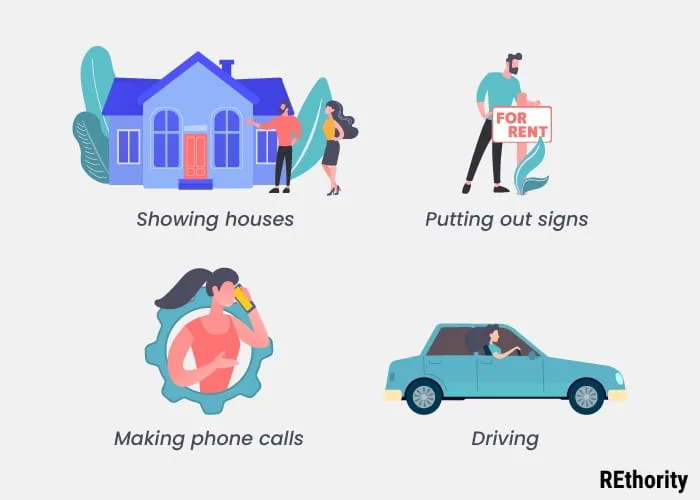
There may not be a typical day in the life of a real estate agent, but that’s what appeals to a lot of people.
You can expect, however, that you will be working every single day to promote yourself and your business, as well as planning how you can best advertise your services.
In fact, planning is one of the things real estate agents get very good at. You must be able to determine where the money is best spent when it comes to promoting properties both online and in print.
You can also spend a lot of time researching potential properties and following up on leads. Open houses and showing houses are also very routine for real estate professionals.
Do You Have What It Takes?
So, what kind of qualities make for a successful real estate salesperson anyway? A lot of it involves drive. The hard work you put into your business is directly proportional to how successful you are.
If you want to be a residential agent who buys and sells homes on behalf of everyday people, then you have to have a passion for bringing buyers and sellers together.
Most of the time, residential real estate agents are very good at handling the emotional side of real estate. After all, a home is more than just a commodity to many people – it’s where memories are made.
If you want to become a commercial real estate agent who buys and sells business properties, then you need to have a knack for numbers.
That’s because commercial real estate transactions can be worth millions of dollars and your clients need to know that you’ll be on top things when handling such large transactions.
For every real estate agent, being friendly, tenacious, transparent, and charismatic are all great qualities to have. The ability to sell yourself and market your services also comes in handy since self-promotion is key to real estate victory.
Real Estate Agent Quiz
Want a sure-fire way to tell if you’re cut out for real estate? Take our quiz! Simply click the link below, answer some questions, and we’ll tell you whether or not you’re cut out for real estate.
Should You Become a Real Estate Agent?
There’s a reason that there are currently over 2 million active real estate agents in the United States – it’s a great career. But with any career, there are pros and cons.
If you want unlimited earnings potential, are seeking a new career opportunity, or just enjoy real estate, becoming an agent is worth exploring.
While the job is tough, it can be extremely rewarding for those with the discipline and drive to succeed. We hope our guide has helped explain this career path.
If we’ve convinced you that a career in real estate is for you, click the link below to learn about the most flexible way to jump start your career with online real estate classes. You’ll thank us later!

